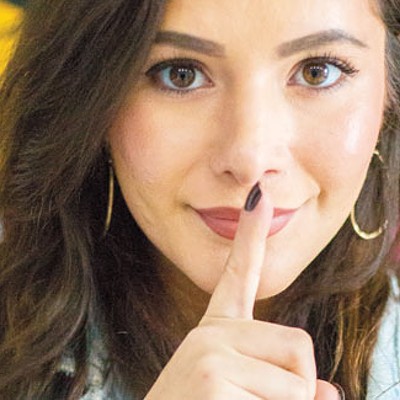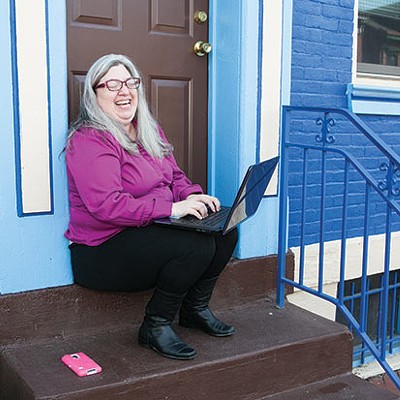Dr. Kathy Homrok breezes into the small beige examining room at Metro Family Practice, Wilkinsburg, a sheaf of papers in her hand. Chipper as always, dressed informally in dark slacks, blue sweater and stylish black-and-white jacket, she greets George, an elderly man in blue jeans and a white T-shirt.
"Hop on up there, big guy," she says while gesturing at the exam table, "and let me take a look at you."
George is hard of hearing, so Homrok more or less shouts at him. He'd wound up in the hospital with dizzy spells; after a CAT scan and cardio check, he's back in the clinic.
Homork assiduously types case information into her computer as she asks George about his symptoms.
"We all feel a little light-headed now and then," he says, "but I never had one like that."
She peers at her electronic notes. "We could put you on Plavix," Homrok allows, adding that the oft-prescribed blood thinner might help. But "I'm not sure I want to do that." There are side effects that could be troublesome — and since George doesn't absolutely need it, she votes no. "How do you feel about that?" she asks.
He agrees.
"I'm not feeling the need to put you into the MRI," she adds. "But if you have any numbness or tingling, go back to the ER immediately."
"Sounds like a good plan to me," George nods.
"Anything happens this weekend," says Homrok, shaking his hand and winking, "you let me know."
This isn't the first street-level program for Homrok, a Connecticut native who will celebrate 13 years in Wilkinsburg this month. But when another area health-provider decided to close its clinic, Homrock was loath to leave her patients or the neighborhood — both poor and desperately in need of health care. So Homrok and other loyalists created a workable medical-business model, then cobbled together enough support to stay.
Homrok and her colleagues treat some 5,000 patients each year. Their clients are racially diverse, typically uninsured, and often members of the LGBT community. "We treat people like human beings," says Homrok with a shrug. "A lot of our patients have had experiences elsewhere with homophobia."
These days, Metro's reimbursements only stretch so far. "Although we're usually able to do something for people in dire straits," Homrok says, "that's not a hard-and-fast rule. One of my patients has a herniated disc in his back, but no money and no insurance for an MRI. As painful as it is, he'll just have to live with it."
She pauses, exhales. "There's only so much we can do."
And what she can do is spend long days delivering health care. There are hospital rounds early in the morning, followed by hours doing clinic work. "It's crazy today," Homrok says. "Every day, really." With the change of seasons, and so many uninsured people needing care, Homrok will see 11 patients in three hours today.
Here's Rebecca: older, a smoker and with calcium deposit in her shoulder. She needs arthroscopic surgery to get her arm working and pain-free.
"How's the smoking?" Homrok asks.
"Cutting back," Rebecca says.
Homrok offers a fist-bump reward.
"That's easy today," she says. "You're a piece of cake, lady."
"With a strawberry on it," Rebecca wheezes, then smiles. "You're wonderful. You always are."
Next is Donna, a post-abdominal-surgery patient with bowel problems, sore ribs and trouble with her appetite. The pain meds aren't working. "I'm not feeling that good," Donna nearly weeps.
"Oh, lordy, lordy, lordy," Homrok says. "You went through a major, major surgery. So it's going to take you a little longer to bounce back."
They discuss drugs, recuperation times, lost strength. Donna's pack-a-day habit isn't helping, but Homrok remains unfazed. "When you're going through something like you're going through," she says, "I don't expect you to change."
Homrok writes her a 'scrip for Percocet. "Do you want to try it?"
"Hm-mm," Donna says, looking like she'll try anything to stop the pain.
"Donna, Donna, Donna," Homrok says, "I don't know if this is helpful or not, but you're going to get better."
Donna shrugs and smiles slightly.
The prognosis for health-care providers like Metro isn't quite as certain.
"We worry about who's going to take up family medicine in these neighborhoods — where you make a real difference in people's lives," Homrok says.
Still, she adds, "It's incredibly gratifying. Serving here is a real honor and a privilege."



















